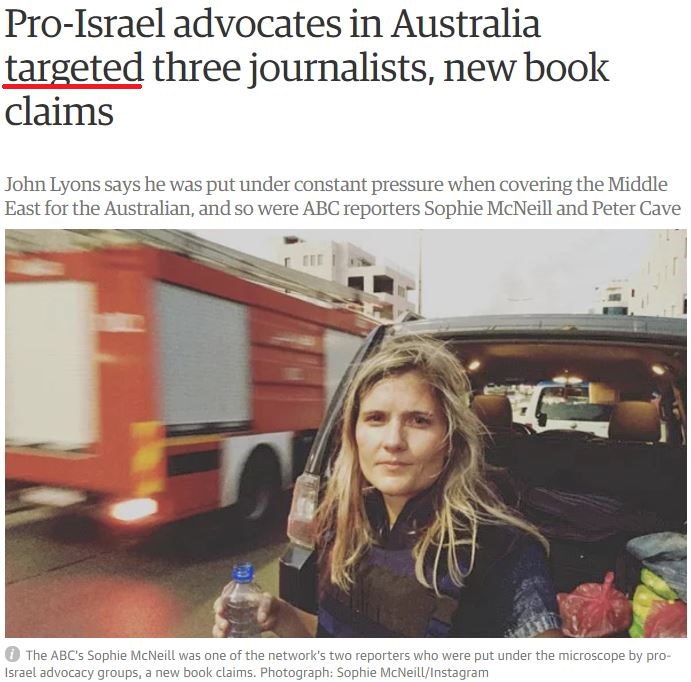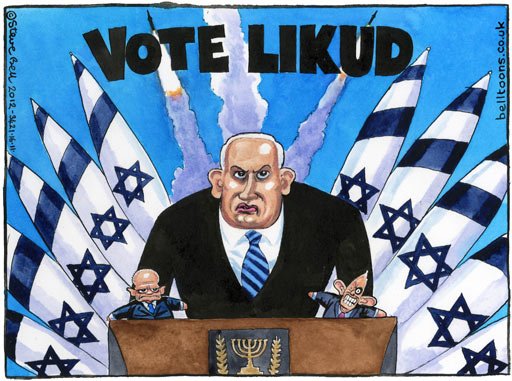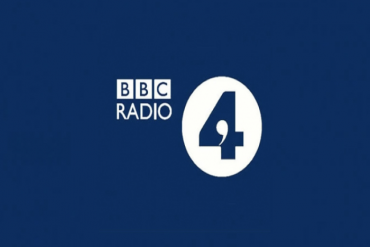Australian journalist John Lyons was among those in the media who, in 2014, leveled entirely false accusations that Israel sadistically tortured Palestinian children, abuse which purported to include whippings, beatings while tied to a cross and the practice of “caging Palestinian children outdoors”. As CAMERA noted at the time, Lyon’s report for Australia Broadcasting Corporation’s (ABC) “Four Corners” was based entirely on uncorroborated Palestinian claims, and – in contravention of basic journalistic ethics – Israeli officials were never given the opportunity to respond to the charges.
Senior IDF officials later characterised accusations by Lyons as “completely fictitious”.
Greg Sheridan, a colleague of Lyons at The Australian, referred to the Four Corners hit job on Israel as “a crude piece of anti-Israel propaganda that revived some of the oldest anti-Semitic tropes”.
These false charges that Israel tortures Palestinian children resulted in a row between Lyons and Australia/Israel & Jewish Affairs Council (AIJAC), a group which advocates the interests of Australia’s Jewish community. Echoing narratives that those who follow our blog would recognize, Lyons claimed in his 2014 op-ed at The Australian that AIJAC stifles criticism of Israel by bullying journalists, a narrative which he developed further in a book published this year which was the focus of a July 28th Guardian article by Amanda Mead.
The first sign that Lyons is going to receive sympathetic coverage from the Guardian is the headline:
It becomes clear in the article that the highly evocative term “targeting” refers to the evidently insidious practice of attempting to hold Australian journalists accountable to accurate reporting about Israel. Here are some of the ‘shocking revelations’:
Pro-Israel advocacy groups in Australia targeted the Middle East correspondent of the Australian newspaper and two ABC reporters, a new book claims. John Lyons says he was subjected to consistent pressure from the Australia/Israel and Jewish Affairs Council (AIJAC) while based in Jerusalem for the Australian for six years, as were the ABC’s Sophie McNeill and the veteran ABC correspondent Peter Cave.
In his Middle East memoir Balcony Over Jerusalem, Lyons says Cave told him another group prepared dossiers on Cave and other ABC reporters “and sent them to like-minded journalists and members of parliament”.
Of course, “dossiers” in this context all but certainly refers simply to publicly available information, such as past examples of reports which were biased or inaccurate.
It gets better:
Lyons says pressure also came from inside his own paper. He says the former editor of the Weekend Australian Nick Cater refused to publish his work and the pro-Israel lobby bombarded editors with criticism of his reports.
Whilst we don’t know why Cater refused to publish Lyons’ work, note how he attempts to frame mere criticism of his reports by pro-Israel groups as something sinister.
Another putative example of intimidation cited in Lyon’s book was a 2015 file sent by AIJAC to Jewish members of the ABC board with information on ABC Middle East reporter Sophie McNeill – a file which evidently included examples of her egregious anti-Israel bias. Lyons contextualized AIJAC’s criticism of McNeill as a line of attack “employed by lobby groups internationally”.
The ‘conspiracy’ by AIJAC to influence media coverage of Israel then gets even deeper:
Lyons writes that AIJAC director Colin Rubenstein had unprecedented access to the Australian, speaking regularly to editors and even suggesting articles the paper should run.
However, “speaking regularly to editors” and “suggesting articles” are what lobbying and pressure groups – off all ideological persuasions – in a democracy do, and it’s hard to understand why Lyons would contextualise it as something improper or even sinister.
A final quote from Lyon’s book is telling:
“For more than 20 years, Australians have read and heard pro-Israel positions from journalists, editors, politicians, trade union leaders, academics and students who have returned from the all-expenses-paid Israel lobby trips. In my opinion, no editors, journalist or others should take those trips: they grotesquely distort the reality and are dangerous in the sense that they allow people with a very small amount of knowledge to pollute Australian public opinion.”
It’s remarkable that Lyons, who was so easily manipulated by Palestinian propagandists to believe entirely false charges that Israel tortures children, can criticise pro-Israel advocates for “grotesquely distorting the reality”. But, that’s not the worst part. Lyons doesn’t simply state his passionate, reasoned disagreement with Australian Jews, but instead evokes toxic canards of Jewish control by suggesting that such journalists couldn’t possibly come to their pro-Israel conclusions independently, and that only through the nefarious workings of the Israel lobby can Australian public opinion become so “polluted” with pro-Israel positions.
The fact that the Guardian found Lyon’s conspiracy theory for pro-Israel attitudes in Australia credible would not come as a surprise to anyone even vaguely familiar with the media group’s record on issues pertaining to Israel and antisemitism.






